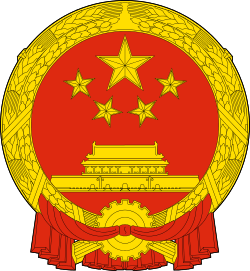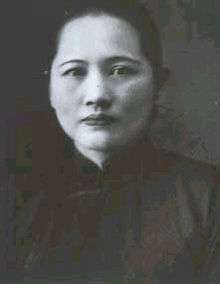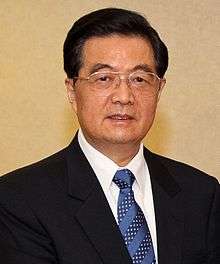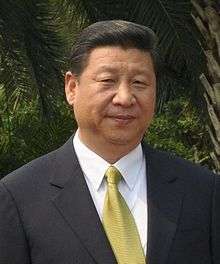Vice President of the People's Republic of China
| Vice President of the People's Republic of China 中华人民共和国副主席 | |
|---|---|
|
| |
|
| |
| Type | largely ceremonial office |
| Residence | Zhongnanhai (informal) |
| Seat | Beijing |
| Nominator | the Presidium of the National People's Congress |
| Appointer | National People's Congress |
| Term length | five years, renewable once consecutively |
| Inaugural holder |
Zhu De as the first President under the 1954 Constitution Ulanhu as the first President under the 1982 Constitution |
| Formation |
27 September 1954 18 June 1983 |
| Abolished | January 1975 - December 1982 |
| Website | Presidency |
 |
| This article is part of a series on the politics and government of China |
|
|
The Vice President of the People's Republic of China (simplified Chinese: 中华人民共和国副主席; traditional Chinese: 中華人民共和國副主席; pinyin: Zhōnghuá Rénmín Gònghéguó Fùzhǔxí), formerly translated as Vice Chairman of the People's Republic of China from 1954 to 1975, or abbreviated Guójiā Fùzhǔxí 国家副主席, literally State Vice-chairman) is a senior ceremonial position in the government of the People's Republic of China.
Selection and Powers
The office was created by the 1982 constitution. Formally, the Vice President is elected by the National People's Congress in accordance with Article 62 of the Constitution. In practice, this election falls into the category of single-candidate' elections. The candidate is recommended by the Presidium of the National People's Congress, which also theoretically has the power to recall the Vice President.
By law, the Vice President must be a Chinese citizen of 45 years of age or older. He or she cannot serve for over two terms, a term being the equivalent of one session of the NPC, which is five years.
The Vice President's duties include assisting the President, and replacing him should he resign or die in office. In reality the position of the Vice-President is mostly ceremonial; Vice Presidents Zeng Qinghong, Hu Jintao, and Xi Jinping have been members of the CPC Politburo Standing Committee and the Central Secretariat, the country's main decision making bodies; these three served concurrently as the first-ranked Secretary of the Secretariat, in charge of party affairs.
The Vice-President may play a major role in foreign affairs. For instance, the Vice-President generally sits on the Foreign Affairs Leading Group, a policy coordination body of the Communist Party. The Vice-President has also typically sits on the Central Coordination Group for Hong Kong and Macau Affairs. Therefore, while the Vice-President may not actually have substantive powers as defined in the Constitution, the office nonetheless carries significance and prestige. The holders of the office have all been individuals with a degree of political clout.
Currently, Vice-President Li Yuanchao is the member of the Politburo of the Communist Party of China, but not the Standing Committee.
List of vice presidents
First Administration Second Administration Third Administration Hu–Wen Administration Xi–Li Administration
Central People's Government (1949–1954)
Vice Chairmen of the Central People's Government
- Co-serving (1 October 1949 – 27 September 1954)
The 1st Constitution (1954–1975)
Vice Chairmen of the People's Republic China
| Portrait | Name (BirthcDeath) Constituency |
Term of office | NPC | Chairman | |||
|---|---|---|---|---|---|---|---|
| 1 |  |
Zhu De 朱德 (1886–1976) Sichuan At-large |
27 September 1954 | 27 April 1959 | I | Mao Zedong | |
| The first Vice Chairman of the People's Republic of China. | |||||||
| 2 |  |
Song Qingling 宋庆龄 (1893–1981) Shanghai At-large |
Dong Biwu 董必武 (1886–1975) Hubei At-large |
27 April 1959 | 17 January 1975 | II · III | Liu Shaoqi |
| Served jointly as Vice Chairmen. | |||||||
| Vacancy by ascension and post abolished | |||||||
The 4th Constitution (1982–present)
Vice President of the People's Republic China
| Portrait | Name (Birth–Death) Constituency |
Term of office | NPC | President | ||
|---|---|---|---|---|---|---|
| 3 |  |
Ulanhu 乌兰夫 (1906–1988) Inner Mongolia At-large |
18 June 1983 | 8 April 1988 | VI | Li Xiannian |
| An ethnic Mongol and former Chairman of Inner Mongolia, Ulanhu served as the first Vice President under the 4th Constitution of the People's Republic of China. | ||||||
| 4 |  |
Wang Zhen 王震 (1908–1993) Xinjiang At-large |
April 1988 | 12 March 1993 | VII | Yang Shangkun |
| Wang Zhen, a Communist military leader, was perhaps best known for leading the People's Liberation Army into Xinjiang at the foundation of the People's Republic. In 1988 Wang assumed the title of Vice-President in an honorary capacity, after his failed effort to put the conservative Deng Liqun in the position of General Secretary. Wang was the second Vice President under the 4th Constitution of the People's Republic of China. He died in office. | ||||||
| 5 | Rong Yiren 荣毅仁 (1916–2005) Shanghai At-large |
12 March 1993 | 15 March 1998 | VIII | Jiang Zemin | |
| A member of the China Democratic National Construction Association, a recognized non-Communist political party in China, Rong served as the third Vice President under the 4th Constitution of the People's Republic of China. | ||||||
| 6 |  |
Hu Jintao 胡锦涛 (1942– ) Guizhou At-large |
15 March 1998 | 15 March 2003 | IX | Jiang Zemin |
| Hu, the former party chief of Guizhou province and the Tibet Autonomous Region, served as the fourth Vice President under the 4th Constitution of the People's Republic of China. In his capacity as Vice-President, Hu was probably best known for handling the aftermath of the United States bombing of the Chinese embassy in Belgrade. Hu was the first member of the Politburo Standing Committee to assume the post since the adoption of the 1982 constitution. In 2003, Hu became the first Vice President to become President. | ||||||
| 7 |  |
Zeng Qinghong 曾庆红 (1939– ) Jiangxi At-large |
15 March 2003 | 15 March 2008 | X | Hu Jintao |
| Zeng Qinghong, who had come to prominence as a political aide to Jiang Zemin, served as the fifth Vice President under the 4th Constitution of the People's Republic of China. Also a member of the Politburo Standing Committee. | ||||||
| 8 |  |
Xi Jinping 习近平 (1953– ) Shanghai At-large |
15 March 2008 | 14 March 2013 | XI | Hu Jintao |
| Xi, the former party chief of Zhejiang, then Shanghai, became the sixth Vice President under the 4th Constitution of the People's Republic of China and the second Vice President to become President. Also a member of the Politburo Standing Committee. | ||||||
| 9 |  |
Li Yuanchao 李源潮 (1950– ) Jiangsu At-large |
13 March 2013 | Incumbent | XII | Xi Jinping |
| Li, the former party chief of Jiangsu, became the seventh Vice President under the 4th Constitution of the People's Republic of China. A member of the Politburo. In his capacity as Vice-President, Li represented China at numerous international events of symbolic significance, such as the State Memorial Service of Nelson Mandela, and the state funeral of Lee Kuan Yew. | ||||||
See also
- President of the People's Republic of China
- Political position ranking of the People's Republic of China
- Paramount leader
- List of premiers of the People's Republic of China
- List of vice premiers of the People's Republic of China
- List of current Vice Presidents
